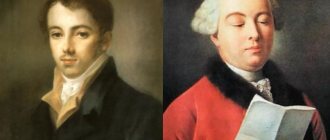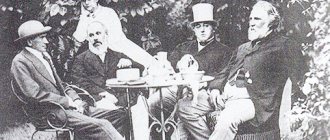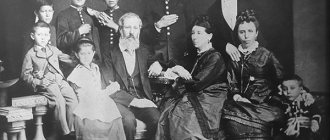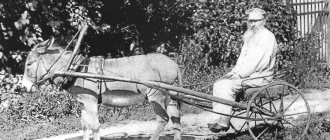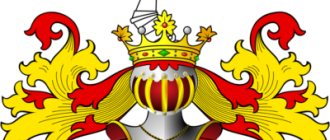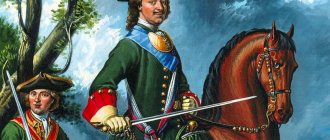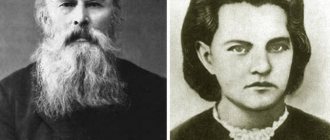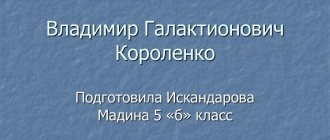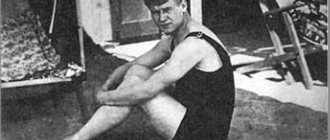January 25, 1938 – July 25, 1980 (42 years)
4.5
Average rating: 4.5
Total ratings received: 1864.
Vysotsky Vladimir Semyonovich (1938–1980) - Soviet poet, singer, professional actor, laureate of the USSR State Prize. Author of many songs that were heard in films. During his life, Vysotsky wrote more than 600 poems and songs on various topics.
The material was prepared jointly with a teacher of the highest category, Ekaterina Valerievna Alexandrova.
Experience as a history and social studies teacher - 11 years.
Training, first roles
In 1953, Vysotsky became a member of the drama club, under the leadership of the Moscow Art Theater artist V. Bogomolov. In the same year, the poet created his first poem - “My Oath”.
In 1955, Vladimir Semenovich graduated from school and entered the Civil Engineering Institute in Moscow. Six months later, he leaves the institute, deciding to enter the theater school.
In 1956, Vysotsky, whose biography abruptly changed direction, entered the acting department of the Moscow Art Theater School. In 1959, Vladimir Semenovich made his debut in a theater production (Porfiry Petrovich in Crime and Punishment) and a film (the film Gossip Girls).
Childhood and origins
Vladimir Vysotsky was born on January 25, 1938 on Third Meshchanskaya Street. The poet's parents, Nina Maksimovna and Semyon Vladimirovich, met in 1935. The boy was named Vladimir at the request of his father, who was leaving on a business trip and knew that a son could be born in his absence.
In March 1941, the father of the future poet was called up for military service, and 4 months later the war began. Then mother and son evacuated to the east of the country. So, for two years they lived in the village of Vorontsovka. Nina Maksimovna worked at a local distillery. The son lived in kindergarten separately from his mother.
In 1943 they returned to Moscow. The marriage of Vysotsky’s parents broke up: another woman appeared in his father’s life - Evgenia Likhalatova (he met her while serving in the Main Communications Directorate of the Red Army).
Actor and musician
After completing his studies, since 1960 Vladimir Semenovich has been working at the Drama Theater named after. Pushkin in Moscow. In 1961, Vysotsky wrote his first song - “Tattoo”.
After working a little at the Theater of Miniatures, Vladimir Semenovich got a job at the Taganka Theater of Drama and Comedy. In 1968, the musician’s first album, “Songs from the movie “Vertical””, was released.
In 1970, an important event occurred in Vysotsky’s personal life - the poet married actress Marina Vladi, who became his third wife and muse. In the fall of 1971, at the Taganka Theater, Vladimir Semenovich debuted with his most famous role - Prince Hamlet from Shakespeare's tragedy of the same name.
Life in cinema
Vysotsky played his first acting role in the film “Peers”. This was followed by more serious films: “The Career of Dima Gorin” and “The 713th Requests Landing.” However, directors still did not trust him with leading roles.
Perhaps this was due to the fact that Vysotsky began to abuse alcohol. Subsequently, alcohol became the cause of many problems in his personal and creative biography.
The film “Vertical” brought national love and recognition to Vladimir Semenovich, for which he wrote all the musical compositions. The day after the film was released, Vysotsky became the favorite actor and musician of many Soviet citizens.
Once upon a time, in his distant childhood, young Volodya performed compositions by popular authors on the guitar, and now in every courtyard group young people vied with each other to sing his own songs.
Vysotsky really liked cinema, so, despite the colossal workload in the theater and constant bard concerts, he continued to act in films with famous directors.
He managed to play in such popular films as “Two Comrades Served,” “Master of the Taiga,” “Brief Encounters,” etc.
Despite the recognition of the public, Vysotsky was in serious confrontation with the authorities of the USSR. The Communist Party constantly put a spoke in the musician’s wheels, doing everything possible to prevent the spread of his songs.
To be fair, it should be noted that with all this, many heads of government agencies openly sympathized with Vysotsky, helping to resolve certain problems.
Due to the constant incredible workload, Vladimir Vysotsky began to drink seriously, which is why he was repeatedly kicked out of his native Taganka theater.
However, then he was again offered the main roles, which he performed brilliantly on stage. It was at this time that he played Hamlet, which became his calling card.
No matter what problems the bard faced in life, he never faked it, but completely devoted himself to what he loved.
For the first time on television he was shown in the Estonian program “The Guy from Taganka”, where viewers could learn in more detail about the life of their idol. Then he appeared on French television, where he performed original songs and answered questions from the audience.
Despite the enormous interest in Vysotsky on the part of domestic and foreign citizens, during his lifetime he was never shown on the USSR Central Television.
One of the most iconic roles in the actor’s creative biography was his work in the TV series “The Meeting Place Cannot Be Changed.” Vysotsky played senior detective Gleb Zheglov so skillfully and truthfully that the image of this hero became attached to him for the rest of his life.
Many quotes and popular expressions from this film entered Soviet culture as an integral part of it.
Last years
In February 1978, Vysotsky was awarded the highest category of pop vocalist. While touring with the Taganka Theater troupe, Vladimir Semenovich visited Bulgaria, France, Germany, Yugoslavia, Canada, the USA, Poland, Mexico, Hungary, and Tahiti.
In Vysotsky’s brief biography, it is worth mentioning that in the last years of his life the actor became addicted to drugs, smoked a lot, and drank a lot. In 1979, during a performance in Bukhara, Vladimir Semenovich experienced clinical death.
On July 18, 1980, Vysotsky played the role of Hamlet for the last time. A week later, on July 25, 1980, Vysotsky died of heart failure. The poet was buried at the Vagankovskoye cemetery in Moscow.
Romance with Afanasyeva
It is reliably known that Vysotsky had an affair with Oksana Afanasyeva, his junior by 20 years. It was real love with reverent courtship and deep feelings.
The artist’s legal wife lived in Paris at that time, but at the same time she knew very well about her husband’s love affairs.
Soon Afanasyeva moved to Vysotsky’s apartment and began living with him. After a little time, the artist began to cheat on her.
Interesting Facts
- Vysotsky's work includes about 600 songs and more than 850 poems. He starred in 28 films and participated in 15 performances.
- Vysotsky was married three times: to Iza Zhukova, Lyudmila Abramova and Marina Vladi.
- In 1975, Vysotsky’s poem “From a Travel Diary” was published in the collection “Poetry Day”.
This was the first and last publication of the poet during his lifetime. - The Vysotsky Club is located in the building of the Vysotsky Museum on Nizhny Tagansky Dead End. Five films have been made about the poet, many books have been written (the most famous are by M. Vladi, I. Vysotskaya, L. Abramov, P. Leonidov, A. Demidova, V. Novikov, E. Ryazanov).
- Vysotsky always played only seven-string guitars.
All interesting facts from the life of Vysotsky
Relations with authorities
Most of Vysotsky's poems and songs were written on the topic of the day. The poet criticized Soviet reality, and the ruling elite saw in his texts a mockery of Soviet power. That is why in the last years of the poet’s life, Vysotsky’s poems were not published, and concerts were prohibited.
Only a year after the artist’s death, in 1981, the first collection of poems entitled “Nerve” was published. Another seven years later, a collection of poems and songs “Favorites” was published, which included “Mass Graves”, “Song about a Friend”, “Bathhouse in White”, “Wolf Hunt” and many others. The era of perestroika revealed to readers an unfamiliar Vysotsky - a sophisticated intellectual with the vocabulary of a guy from the yard. He spoke about serious matters simply, sang openly and passionately, spoke honestly and without cuts. Naturally, the popularity of such a person was ideologically harmful to the party, so Vysotsky suffered from endless bans, trials and disputes. He was arrested more than once and in recent years was even banned from traveling abroad (which he was previously allowed to do). Apparently, the atmosphere of lack of freedom and depression weighed heavily on the poet and contributed to the development of his illness - drug addiction.
Key achievements
Rice. 1. Vysotsky on stage
Vladimir Vysotsky has hundreds of original songs that have become hits of all times, and dozens of theatrical and film roles. He was not only a poet, but in many ways also a philosopher, as well as the author of prose and scripts for theater and cinema.
It was under his influence that the inimitable image of Gleb Zheglov was created, who became the idol of all Soviet boys. For playing this role, Vysotsky became a laureate of the USSR State Prize.
Vysotsky's songs have been and continue to be heard in many Soviet and Russian films. He was the idol of millions, despite the constant nagging and restrictions of the government regarding censorship. Vladimir Semenovich became the voice of his generation and in many ways formed the basis of Soviet culture. There is not a single Russian who is not familiar with the name of Vysotsky and at least several of his songs.
Detailed biography
In winter, on January 25, 1939, the future great - poet, actor and performer of songs written by himself - Vladimir Vysotsky was born in Moscow. Takes 2nd place in the list of “Russian idols of the 20th century”, making a concession to Yuri Gagarin.
Childhood
Little Vova lived in a communal apartment with his father and mother: Semyon Vladimirovich and Nina Maksimovna. At the beginning of World War II, the boy was only 4 years old; during this period, his parents decided to divorce. Five years later, despite all the difficulties in life, Volodya is interested in and regularly practices music. A year later, he unexpectedly becomes interested in theater, as a result of which he begins to attend a theater club.
After school, the young man entered the Moscow Institute of Construction, but dropped out of school after some time, since there was no attraction to this activity. The craving for the theater takes over, and Vysotsky enters the Moscow Art Theater. After his first appearance on stage, the rest of his life was connected with the theater.
Vysotsky's creativity
Vladimir was interested in poetry even at school age, but began to create thoroughly in this area in the 60s. However, despite attracting people, he did not take his songs seriously. Every day, Vladimir Vysotsky gained popularity, performed at various concerts, received many awards, all the while managing to arrange his personal life. But he was in conflict with the USSR government. The authorities did everything to prevent the artist’s songs from being distributed.
As a result of great moral stress, Vysotsky began to drink, which caused another set of problems. But Vladimir coped well with all the difficulties, without ceasing to pursue his favorite hobbies. He wrote almost 600 songs and about 200 poems. In 1978, he was awarded the highest category of vocalist and pop soloist. Despite health problems, in the last years of his life, Vysotsky did not stop giving concerts in front of the public, while simultaneously performing in the theater.
Death of Vladimir Vysotsky
Vysotsky’s health was not all right. The use of drugs and alcoholic beverages did not go without a trace. In 1969, the first attack in his life occurred with serious consequences. A year later, he was diagnosed with a persistent drug addiction. And later it turned out that he couldn’t live without it even for a day.
On July 25, 1980, Vladimir Vysotsky died, he was 42 years old. He had a presentiment of this, telling his family. The cause of his death is not clear, since they decided not to perform an autopsy, but his mother was sure that Vladimir was killed by narcotic substances.
Vladimir Semenovich died many years ago, but his memory still remains in our hearts.
Biography by dates and interesting facts. The most important.
Musical and literary creativity
Vysotsky was widely known as a performer of his own compositions with a Russian seven-string guitar. He had a unique voice timbre.
In 1961 he wrote his first song - “Tattoo”.
In 1963 he began recording music in the studio. Since the mid-1960s, he conducted concert activities - first as part of a group of artists of the Taganka Theater, then solo. The first public performance took place on January 18, 1967 at the Leningrad amateur song club “Vostok”.
Vysotsky's work was distinguished by a variety of song themes. The early period was characterized by reliance on the traditions of urban romance. Vysotsky wrote variations on “yard”, “thieves” themes (“I’m in business, and I have a knife with me...”, “The one who was with her before”, “The bride is crying honestly for me”, “Guys, write me a letter” and etc.).
Then his repertoire included military (“Penal battalions”, “Song of the Stars”, “Everyone went to the front”, “Mass graves”, “He did not return from the battle”, “Letter”, etc.), lyrical (“Home” crystal”, “White Waltz”, “Candles are lit for me every evening...”, “Here the paws of the fir trees tremble in the air...”, “Ballad of Love”, etc.) and philosophical compositions (“Fasicky Horses”, “Ballad of Time” ”, “About fatal dates and numbers”, “The pacer’s run”, “Two destinies”, “Parable of Truth and Lies”, etc.).
He also performed songs about sports (“Professionals”, “Song about a Sentimental Boxer”, “Marathon”, “Goalkeeper”, etc.), comic and satirical (“Song about Rumors”, “Victim of Television”, “About James Bond, agent 007”, “Masquerade Ball”, “Instructions before traveling abroad, or half an hour at the local committee”, etc.). A number of songs used fairy-tale motifs: “About a wild boar”, “Song-tale about evil spirits”, “Song-tale about a genie”, “In the distant constellation Tau Ceti”, etc.
In total, Vysotsky wrote more than 600 songs. During his lifetime, only seven EPs (small gramophone records) with various recordings were released, as well as the export record “Vladimir Vysotsky Sings His Songs” (1978). Vysotsky held concerts in many cities of the Soviet Union, and several foreign performances took place in the 1970s. According to researchers, in total he gave about 1 thousand 500 concerts.
He was also the author of over 200 poems. Among the most famous are “My Hamlet” (1972), “My Black Man in a Gray Suit...” (1979), etc.
Vysotsky wrote several prose works. Among them: the story “Dolphins and Crazy” (1968, first publication in the USSR - 1989), “Novel about Girls” (1977, first publication in the USSR - 1988), film script “Vienna Holidays” (1979, together with Eduard Volodarsky) etc. In the second half of the 1970s, in collaboration with Leonid Monchinsky, he worked on the novel “Black Candle” (first publication in the Russian Federation - 1992).
In 1975, Vysotsky’s poem “The Wait Lasted, but the Farewell was Short,” was published in the literary and artistic almanac “Poetry Day,” which became his only poetic publication during his lifetime.
In 1979, Vysotsky became one of the authors of the samizdat almanac Metropol, in which the texts of 18 of his songs were published.
On January 22, 1980, his only lifetime filming took place on the Central Television of the USSR State Television and Radio Broadcasting Company - for the program “Kinopanorama”. However, the recording was shown on air under the title “Vladimir Vysotsky. Monologue" only in 1987.
The first collection of Vysotsky’s poetic works, Nerve, was published by the Moscow Sovremennik publishing house in 1981, after the author’s death.
Vysotsky was one of the most famous performers in the Soviet Union. His work received national recognition.
Cinematic "height"
Vladimir Vysotsky. Photo: vsvysotsky.ru
Vladimir Vysotsky as Volodya in Stanislav Govorukhin’s feature film “Vertical” (1967)
Vladimir Vysotsky. Photo: vsvysotsky.ru
After his film debut during his student years, Vladimir Vysotsky played several roles in the films “The Cook,” “Sasha-Sasha,” and “Master of the Taiga.” These were minor characters. Over time, directors noticed him and began to invite him to larger roles. So he played the main characters in the films “I Come From Childhood” and “Brief Encounters.” Already in these films, Vysotsky performed his songs.
Popularity came to the actor in 1967, after the role of radio operator Volodya in the film “Vertical”. The film featured Vysotsky’s original songs “The Top”, “Song about a Friend”, “Every Man Has His Own Grievances” and others. Writer Nikolai Andreev noted that after the release of the film, “Vysotsky’s fame rushed... vertically upward.” Newspapers began to print the lyrics of the songs from the film, and a year later a flexible gramophone record appeared with the songs themselves.
However, Vysotsky’s career was undermined by a journalistic campaign against his songs. At first, the Pravda newspaper criticized the actor, “hoarsely wailing wild thieves’ songs and relishing thieves’ jargon.” Then the newspaper “Soviet Russia” published a devastating article about songs from Vysotsky’s repertoire, “which are played in the evenings in the gateways.” A little later, the same newspaper published the material “What Vysotsky Sings About”: “Under the guise of art, philistinism, vulgarity, and immorality are presented. Vysotsky sings on behalf of and in the name of alcoholics, fines, criminals, vicious and inferior people.” In "Tyumenskaya Pravda" Vysotsky was called a performer of "dirty and vulgar songs", "fake recitatives with two or three well-worn chords."
I play very primitively, and I often hear reproaches about this. This primitivization is deliberate: I deliberately make a simplified rhythm and melody so that it immediately enters not only my viewers’ ears, but also their souls, so that the melody does not interfere with the perception of the text.
Vladimir Vysotsky
